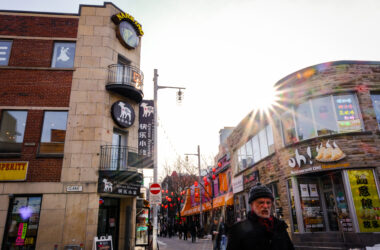At the southwest warehouse of Montreal’s star micro-distillery Cirka Distilleries rows of awards line a public tasting counter. Cirka’s sleek website echoes this artisanal aesthetic and invites guests to peek behind the curtain by touring their space, breaking the seemingly intricate process of distillation down into simple steps.
The Cirka building is an open warehouse with high ceilings and is filled with the sweet, heady smell of gin botanicals. Weaving in between barrels and past humming machines, distiller Isabelle Rochette expertly explains the three steps of the distillation process to visitors: Cooking the grain, turning starch into fermentable sugar, and then fermentable sugar into alcohol through fermentation with yeast, and, finally, extracting and refining the alcohol. From start to finish, production takes place between three rooms; the bottling line is laid out a stone’s throw from where the grain is cooked at the beginning of the process.
In the back is what Rochette refers to as the ‘controlled chaos’ warehouse, which houses everything from bottles, grain, product packaging, and whiskey barrels. Whiskey needs to be aged for three years to be labelled as such in Canada—the same standard as in Scotland—and Cirka plans to release their first batch by the end of the year.
Though it is their latest release, whiskey is the driving force behind Cirka. Namesake Paul Cirka worked as a botanist and in the IT industry before deciding that producing whiskey was his calling. With a couple of friends on board, he decided to try to put Quebec whiskey back on the map. The team knew that they had a couple of years of waiting time before coming out with their whiskey, so they began by distilling gin and vodka to debut the brand and build consumer confidence.
“If we [make] good vodka and good gin, [then people will] know we’ll be making good whiskeys,” Rochette said.
Rochette joined the team in 2015 after returning from a motorcycle tour across Canada and the US, trying out distilleries, wineries, and breweries. Rochette, who previously worked in video game development before training as a sommelier, initially planned to open a wine tasting bar in the city when she was connected with Cirka. Both were drawn to Montreal as a home base for a spirits business.
“We really love the energy of Montreal,” Rochette said. “It’s a super curious, epicurean city. We’re lucky in Quebec to have access to really good grains, so that’s why even our rye is local.”
Cirka likes to preserve a local flair in their spirits. Their current lineup includes one vodka and two gins, each made from a base of 100 per cent Quebec corn and the latter two filled with a plethora of regional botanicals. These infusions create a final product with a more complex flavour profile than the overwhelming ‘uppercut of juniper’ that Rochette often tastes in the mass-produced spirits. The company flagship, Gin Sauvage, is distilled using a botanical basket that allows warm vapours travelling upward to infuse the gin with essential oils from the 30 plus botanicals it contains. In creating the second, limited-edition Gin375, the micro-distillery challenged themselves to replicate centuries-old flavours in honour of the city’s 375th anniversary.
“[In developing Gin375] we went to the Château Ramezay in Old Port, […] met with a historian, and asked what [historically] was in the orchards and the medicinal plants that were used, and that’s where we got our inspiration,” Rochette said. “For the base, we dehydrate sour cherries and cranberries, and, once we proof it, down we add [local] honey. [It’s limited edition] because I can only make it twice a year since it’s [made from] all foraged ingredients.”
Cirka is in good company in Quebec, where the local micro-distillery business has boomed in recent years, equally dedicated to creating a unique and well-crafted product. They see themselves as part of a family of local businesses and welcome questions, even from potential competitors.
“Most of the distilleries that are open right now […] passed through here, visited, and talked to us,” Rochette said. “We’re one of the few that are open [for tours], and we like to [explain] the process so people can understand [….] The fact that they want to know more about the industry, about us [makes me] more than happy to do the tours and answer the questions.”









